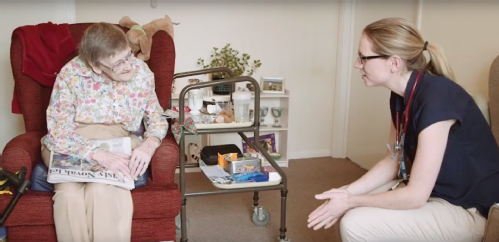What Easter Holiday?

While the first year students have been enjoying their Easter holidays (or more likely doing lots of revision before their upcoming exams!), the Easter holiday for second year students consisted of just the bank holidays, which was bit of a shock to the system! Being a clinical medical student means no more long university holidays but we also don’t have the luxury of choosing our time off like a full time job, core clinical education feels like a long haul at times but we do have a week off between CCE2 and 3 which I am counting down the days to!
This last week we have been out in the community, in year 1 we had community days where we visited patients in their homes and spoke to them about their chronic illnesses, this continues in CCE2 where we visited a patient living with a disability and in CCE3 we will speak to patients receiving palliative care. It is a great privilege to be allowed to visit patients in their homes and ask them very personal questions about their illness and personal circumstances. We ask them difficult questions about their future which are not easy to talk about. Listening to patients talk about these difficult topics helps me learn more about the reality of living with some of these devastating illnesses more than reading any textbook ever could.
Another part of our community days in CCE was a Mini Health needs assessment for our GP practice in CCE1. A health needs assessment involves identifying an unmet health need in a population and identifying what can be done to tackle it and comparing performance of your local practice with those nationally. The GP practice I was based at in CCE1 was in a deprived area of Leamington spa, myself and my clinical partner identified that there was a high smoking prevalence but also relatively low levels of smoking cessation being offered. It was really interesting to see the disease prevalence and socioeconomic data for our practice and think about how this will impact medical provision in that area. These sort of assessments are undertaken all the time by doctors and researchers working in Public Health and they can have a national impact on health policy so it was interesting to see what these involve even on a mini level!
As well as learning about all the different aspect of medicine at Medical school we are also learning about all the different roles that a doctor has. A doctor is not just a clinician coming up with a diagnosis and management plan based on what they were taught at medical school. A doctor is expected to be constantly learning, throughout specialty training and as a consultant to update their skills. A doctor is also expected to be a teacher. At every stage of your career you will be teaching your junior colleagues. Teaching also forms an important part of job applications for specialty training so showing an interest in teaching early on is a wise thing to do! There are lots of opportunities for teaching while at medical school. As a second year student you can get involved in Peer Support teaching to first year students through Peer Support and Student Seminar groups run by MedSoc. A couple of friends and I are going to be running a seminar group for students in Block 5: Child health and Reproduction. For the first years it’s an opportunity to go over difficult topics and get exam tips and for us its great revision and an opportunity to teach. In preparation for this I was a guest teacher leading a session on Cardiac Embryology, not my favourite topic but I got some great feedback and also some really helpful tips to use in the future. Hopefully a chance to put my Medical Education course into practice too!
Joanne
 Megan Earle
Megan Earle

 Loading…
Loading…


Add a comment
You are not allowed to comment on this entry as it has restricted commenting permissions.